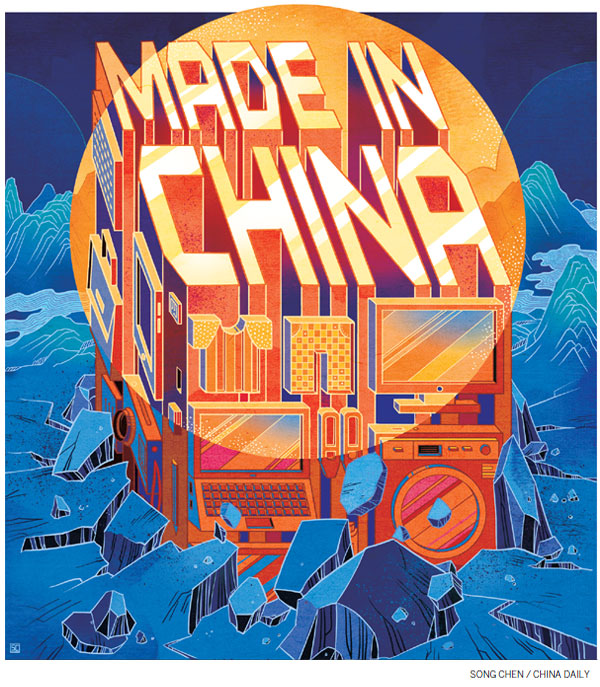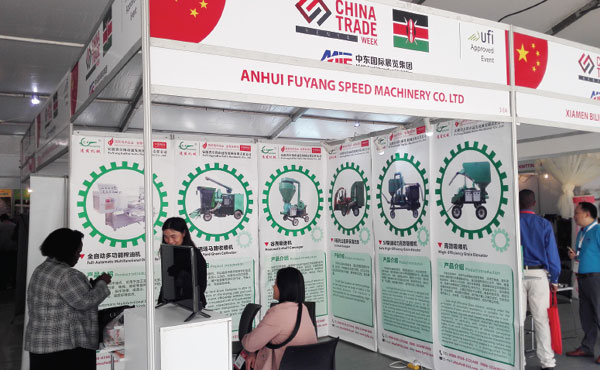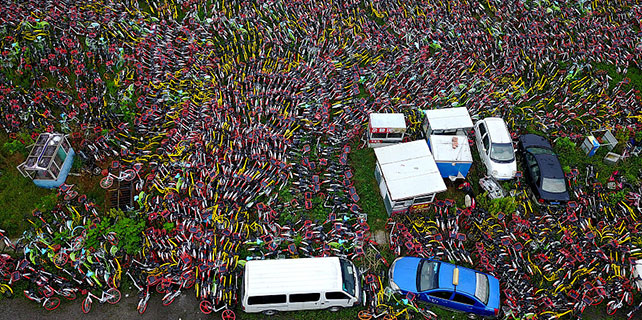Trusted goods

African importers turning to China for quality, convenience
China has become popular in Africa, not only because of its massive infrastructure developments, but also as a key source of goods.
In fact, most businesspeople in Africa have shifted their focus to importing from China. There are two reasons for this.
First, China is currently a low-cost manufacturing center, and so is one of the top choices for African importers looking for cost-effective goods.
Second, import procedures are not as complicated as they are for other parts of the world.
Because of this, many people - including small-and medium-sized enterprises - can source goods directly from China, cutting out middlemen and increasing profits.
Shritesh Lakhani, finance manager of BBC Auto Spares Ltd, a motor vehicle spare parts company based in Kenya, says his company switched from India to China as a source of imports because it meant a lot less bureaucracy.
"Doing business with China is easy compared to other countries. Once I give the specification of what I need, I'm assured of receiving the consignment on time. I'm an Indian, but I prefer dealing with Chinese manufacturers rather than those in my home country," he says.
Similar sentiments are expressed by Patrick Kuria, who has been importing electronic goods from China for the last 10 years. Kuria runs Pes Electricals and Hardware, a company that deals with electrical accessories, water pumps and car washing machines, among other products.
He says the Chinese are honest, friendly and easy to deal with.
"The basic thing that Chinese suppliers are looking for is trust from the importers. With that, you will build a strong business relationship," he says.
Kuria describes China as the world's From page 1 factory, where a businessperson can find almost anything. It may be challenging for newcomers, but, once they have the right information on how to import, it becomes much easier.
"The first step is deciding what to import, finding suppliers, ordering a sample, ordering smaller batches, placing an order and negotiating terms. It is, however, wise to visit the country if you are in a position to do so. This will help ensure that what you import is exactly what you require. It also helps to build confidence with the manufacturers," he says.
According to a recent report by McKinsey & Co, titled Dance of the Lions and Dragons, many African companies are replacing existing imports of equipment and other goods with lower-cost Chinese alternatives.
More than half of the African business leaders interviewed during the research said that cheaper and more easily available items were a major source of value from the Africa-China economic relationship.
For instance, a pan-African packaging company reported that it had previously imported packaging machinery from Germany and Italy but had decided to switch to a Chinese provider.
"The quality of Chinese equipment has been improving rapidly in the past few years and now it's 95 percent as good as German or Italian equipment - yet the price remains very competitive," the CEO of the company told McKinsey& Co.
The CEO said the Chinese supplier was ready to address any issues and was aggressively taking market share from European companies.
Another CEO from a South African company, dealing with the manufacture and distribution of electro-mechanical equipment, says Chinese suppliers take a longer-term view than their Western counterparts.
"Our Chinese supplier is willing to take the risk and do the research and development for the specific parts that we need, then transfer the technology to us in order to build a long-term partnership. Suppliers in Europe are unlikely to do so, and they tend to be far more concerned about their patents," he says.
Bob Wekesa, research associate of the China-Africa Reporting Project at the University of Witwatersrand in South Africa, says the affordability of Chinese products, compared with US and European products, is one of the key reasons behind the growth of African imports from China.
He says it's easy to access products from Chinese manufacturing hubs, especially Guangzhou and Yiwu. In contrast, US and European manufacturing hubs are scattered around several cities, making it difficult for importers to purchase their goods conveniently.
"Compared to the American and European markets, China offers cheap air tickets and shipment costs, so it is more convenient to source goods from the country. Obtaining travel visas is also easier," Wekesa says.
China has overtaken Germany and the United States to become Africa's biggest source of goods.
It has far surpassed Africa's longstanding trade partners such as France, Germany, India and the US.
According to a survey by the Brookings Institution, a nonprofit public policy organization based in Washington, DC, in terms of Africa's imports, Germany was the largest source in 2005, with China just slightly behind and the US ranking third.
However, by 2013 China had become by far the largest source of imports to the continent, with the amount totaling nearly $45 billion, about three times the levels of either Germany or the US. India was the second-largest exporter to Africa, with flows totaling more than $20 billion.
In 2015, Chinese exports to Africa grew further, reaching $103 billion. South Africa was the largest Chinese goods importer, followed by Nigeria and Egypt.
Nevertheless, compared to other parts of the world, Chinese exports to Africa are quite minimal. According to research organization World's Top Exports, 49.8 percent of Chinese exports by value are delivered to other Asian countries, 21.2 percent to North America, 18.5 percent to Europe and 4.4 percent to Africa.
The volume of trade (imports and exports) between China and Africa reached $200 billion in 2013, making China Africa's biggest trade partner. Trade between the US and Africa, on the other hand, amounted to $109 billion the same year.
Angola is China's biggest trading partner in Africa, with an average annual trade of over $18.6 billion, followed by South Africa, with an average annual trade of $16.7 billion.
Among China's top African trading partners, six are oil exporters and three have diversified economies. Trade between China and its top 10 African trading partners accounted for 76 percent of the total trade between China and Africa in 2013.
Until recently, most African traders and consumers associated China with production of substandard goods. This notion has been wiped away by an increasing number of initiatives from the Chinese government to enhance cooperation and friendship with African governments.
The construction of quality infrastructure in Africa has played a key role in building trust. Another initiative has been establishment of Confucius Institutes across the continent, helping Africans to better understand Chinese people and their culture.
|
China Trade Week in Nairobi, capital of Kenya between June 29 and July 1. Liu Hongjie / China Daily |
Kiprop Lagat, Kenya's director of culture, says that through the establishment of Confucius Institutes, as well as various cultural programs like the 1,000 People Plan Project, launched by the Chinese Ministry of Culture, a lot of myths have been dispelled, making it easier for Chinese to do business with Africans.
The project, which aims to train 1,000 Africans involved in various aspects of culture by the end of 2018, has so far seen more than 200 people receive training in cultural management in China.
Chinese exhibitions, especially China Trade Week, organized by MIE Events, have created a platform for Chinese manufacturers to meet African businesspeople. This has extensively helped in building confidence in Chinese manufactured goods, consequently increasing the volume of exports to Africa.
Who is to blame for substandard goods made in China?
Michelle Meyrick, international events director for MIE Events, says the preconception that China only produces low-quality products is a problem experienced not only in Africa but across the globe.
"China can produce very high-quality products, but when buyers have big budgets they think of Europe and the US. When they have low budgets they think of China. iPhones are made in China and I don't think anyone would say they are low quality," she says.
According to the Business Insider website, the reason Apple manufactures iPhones in China is because most of its component supply chain is in China and the country's factories are now far bigger and more nimble than those in US. Additionally, China now has a far bigger supply of appropriately qualified engineers than the US.
Meyrick says China has the resources to make products according to all budgets, from the very low to the highest quality, giving businesspeople freedom of choice.
"We have incorporated conferences into China Trade Weeks in an effort to educate local companies that they can get high-quality, high-tech products from China," she says.
During China Trade Week in Kenya from June 29 to July 1, the conference room was always packed, an indication that businesspeople are eager to learn about importing from China.
Since May, MIE Events has organized China Trade Week in four African countries - Ghana, South Africa, Kenya and Ethiopia - and plans are underway to hold a similar event in Morocco in December.
The response from all of them, Meyrick says, has been amazing and the volume of imports from China is poised to grow further, since the expo has provided Africans with an opportunity to meet face-to-face with manufacturers for discussions and business cooperation.
Julius Sunkuli, the former Kenyan ambassador to China, says China's factories manufacture goods that are meant to comply with standards in the US and Europe, among others. He laments that African businesspeople mostly go for the low standards, the reason Chinese goods have gained such a bad reputation on the continent.
"I urge African businesspeople to go for the best-quality products instead of going for the cheap substandard goods. This gives the wrong impression that China is flooded with such goods," Sunkuli says.
Importer Patrick Kuria says substandard goods are not a Chinese problem but rather an African one.
"If you order cheap products, you can be assured of getting low quality," he says, demonstrating two electronic devices, one heavier (high quality) going for 1,500 Kenyan shillings ($14) and the other one lighter (low quality) going for Ksh200.
"Many people would prefer the cheaper one, which will not last long and may not be effective. Africans should understand that cheap is expensive," he says.
Kuria, an electrician by profession, advises importers who are not professional in the field for which businesspeople they are importing to employ professionals in order to get good-quality products.
"It's important to involve technicians who understand the fine details of what you want to import, especially electronics and machinery," he says.
edithmutethya@chinadaily.com.cn

















